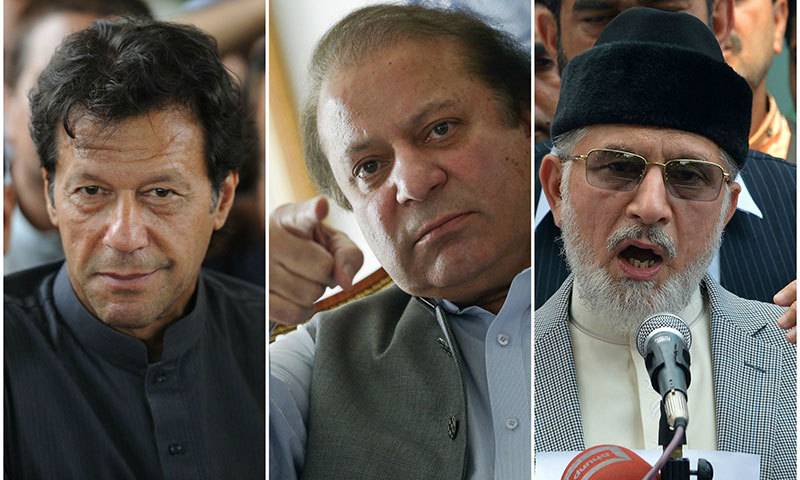As both the government and protesting political parties stick to their guns, there is no sign of any let up in the ongoing political turmoil. With certain significant tactical shifts, both PTI and PAT look committed to their original strategy of ousting PM Nawaz Sharif through street protests and agitation. At first, they decided to convert their long marches into the prolonged sit-ins in Islamabad. Then, in the face of losing public appeal and effectiveness of those sit-ins, PTI started to hold massive public rallies in major cities in the country. Now, PTI chief Imran Khan has announced a ‘decisive war’ against the PML (N) by a massive show of strength in Islamabad on November 30. Likewise, Allama Tahir-ul-Qadri has also returned in Pakistan to protest against the government afresh. On the other hand, the government seems in no mood of abandoning its present ‘constitutional and principled’ stance.
Although the PTI has showed some flexibility by giving up its demand regarding the immediate resignation of PM Nawaz Sharif, it is firm and determined with respect to its demand for the formation of an independent inquiry commission to probe rigging allegations regarding last year’s general elections. Now, it wants the ISI and MI to be included in the proposed inquiry commission. Earlier, the government had offered to set up a judicial inquiry commission comprising three sitting judges of the apex court for this purpose. But owing to certain mutual differences and mistrusts, both stake-holders have not yet been successful in finalizing the plan.
In Pakistan, in case of any electoral irregularity, one has to seek legal remedy through the election tribunal constituted under The Representation of People Act, 1976. Dealing only with individuals’ complaints, this Act doesn’t provide any mechanism to probe into, and decide allegations of any massive or large-scale rigging. Therefore, for the probe of these allegations, the only recourse is to refer this matter to an inquiry commission to be constituted under Pakistan Commissions of Inquiry Act, 1956. As the said act doesn’t provide any comprehensive procedure to deal with such issues, the proposed commission will require some detailed terms of reference to determine its scope, parameters and powers.
Under present circumstances, there is little chance that both the government and protesting political parties would agree on some common TOR’s. What is the definition of electoral rigging? Does an electoral irregularity also amount to electoral rigging? Should this commission audit some sample constituencies or should it examine all electoral constituencies in the country to reach a conclusion? Should any rigging by an individual be used as evidence against the political party he represents? How will this commission fix responsibility, if any, on any one? These will be some of the questions once the commission is formed. Beside this, PTI has also been quite skeptical about the integrity and impartiality of judges of the Apex Court of Pakistan. Likewise, its present demand for the formation of a sort of ‘joint inquiry commission’ has hardly any place in the said Act. In such state of affairs, the formation of an inquiry commission would be nothing but a waste of time.
Although unsubstantiated, rigging allegations made by the PTI and PAT have made the incumbent government suffer a serious legitimacy crisis. Instead of dying away, their agitation is gaining more momentum with the passage of time. The prolonged protest has virtually paralyzed the entire executive structure and administrative apparatus of the country. This political turmoil has also adversely affected the already troubled economy of the country. Now, if the economy is not managed properly, then present dismal economic growth, high inflation and a large fiscal deficit will virtually lead the country to a sort of economic catastrophe. In that situation, the so-called third force would find it justified in making an intervention to stabilize the country.
Analyzing current political prospects, mid-term or snap elections look the only pragmatic solution. At this moment, if the government decides to announce and hold snap elections, it would not only help in ending political turmoil but slogans like ‘Go Nawaz go’ would lose relevance and significance. The government should engage these protesting parties through meaningful dialogue by making snap elections their primary bargaining chip. On the negotiating table, PML (N) can get significant leverage by securing maximum time for such elections. The year 2016 may appropriately be chosen as the year for the next general elections.
During this interim period, some comprehensive electoral reforms can be introduced to ensure credible and indisputable elections in the country next time.
The tragic Model Town incident in Lahore also warrants that the government should now show flexibility. By diluting the demand for the immediate resignation of the PM through announcing snap elections, the government can have the opportunity to effectively meet challenges like stabilization of the economy and fighting terrorism. Otherwise, in the face of continuing agitation and protests, the incumbent government would be quite handicapped in delivering anything good, domestically and internationally.
Democracy doesn’t necessarily only mean the successful completion of tenure by a political government. It is the quality of the democratic dispensation that generally matters and makes all the difference.
The writer is a lawyer.
@MohsinRazaMalik






